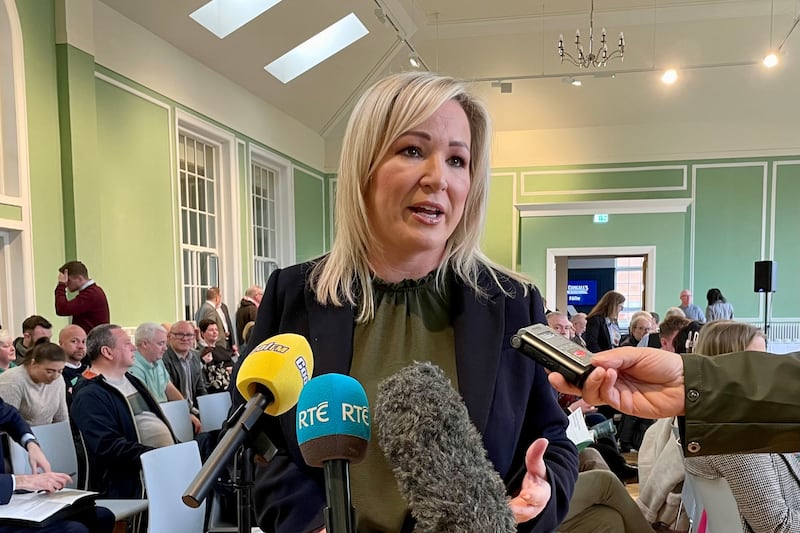ON this date 20 years ago almost one million people across the north went to the polls to register their support or rejection of the Good Friday Agreement – a turnout of more than 81 per cent.
In the Republic, 1.5 million people cast their vote in a corresponding referendum, though at just over 56 per cent, turnout was significantly lower.
It was the first time since 1918 that people throughout Ireland had voted concurrently on the same issue, even if south of the border the ballot paper included an additional question on amending articles 2 and 3 of the constitution, which spelled out a somewhat antiquated version of Irish nationhood, while also laying claim to the six northern counties.
The southern electorate overwhelmingly endorsed the Good Friday Agreement and changes to the constitution, with almost 95 per cent of voters opting for 'Yes'.
North of the border, it was a closer contest - 71.1 per cent said Yes compared to a No vote of 28.9 per cent - and it followed a much more divisive campaign.
Nationalism broadly supported the agreement, though the support of Sinn Féin – and the IRA – was qualified and republicans didn't actively campaign for a Yes vote.
Then SDLP deputy leader Seamus Mallon was characteristically scathing of what he saw as the republican movement's fence-sitting: "You can't have one toe in the water and one toe out."
Sinn Féin's erstwhile comrades in Republican Sinn Féin urged the electorate to reject the agreement, as did the 32-Sovereignty Committee.
"Voting Yes on May 22 will not save us from more Drumcrees or more Harryvilles," said RSF leader Ruairí Ó Brádaigh.
While the Ulster Unionist Party had played a key role in securing the agreement weeks earlier, its support came at a price.
There were defections – Arlene Foster and Jeffrey Donaldson among the most high profile – and internal dissent, best manifested by MPs Willie Ross and William Thompson.
Spearheading the No campaign were DUP leader Ian Paisley and his deputy Peter Robinson, alongside UK Unionist leader Bob McCartney and serial protester Cedric Wilson.
Mr McCartney had been dismissive of the agreement, describing it as an "effort to buy off the IRA, not produce peace". Former UUP leader Jim Molyneaux also opposed the peace accord.
During the campaign, a schism that had opened between the DUP and loyalism became more pronounced.
These two wings of unionism – Christian fundamentalism and working-class, largely secular paramilitaries – were ostensibly incompatible but had been strange bedfellows for much of the Troubles.
Their respective takes on the agreement, however, brought their differences to the surface and for a short while the DUP and the organisations under the Combined Loyalist Military Command banner were bitter adversaries, with the latter siding with nationalism and liberal unionism by vociferously backing the agreement.
Notorious UDA killer Michael Stone, recently released from prison, publicly supported the agreement at a rally in the Ulster Hall a week before polling day.
The Yes campaign also received an endorsement from relatives of victims of the Shankill bomb and the father of Paul Maxwell, the 15-year-old murdered by the IRA in Co Sligo as it targeted Lord Louis Mountbatten.
However, not all victims of the previous three decades of violence were convinced by the agreement and especially that element that saw prisoners released early.
Rosemary Craig, whose RUC officer husband had been badly wounded in an IRA attack, was among those campaigning for No.
It was the early prisoner releases that almost dealt the Yes campaign a fatal blow, as the release of Milltown Cemetery killer Stone and the IRA's Balcombe Street Gang appeared to turn public opinion against the agreement in the days before the poll.
Yes campaign director Quintin Oliver recalls that many organisations were reticent in voicing support for his campaign.
"There was quite a few organisations – including the churches and some business bodies – that wouldn't commit corporately because they said many of their members would dissent," he said.
In the end, the intervention of a range of international statesmen, including Bill Clinton and Nelson Mandela, alongside celebrity endorsements from the likes of Bono and Kenneth Branagh, helped buoy the pro-agreement campaign.
Ultimately 400,000 more people said Yes on Friday May 22 1998 to the famously cumbersome question: "Do you support the Agreement reached at the multi-party talks on Northern Ireland and set out in Command Paper 3883?"






